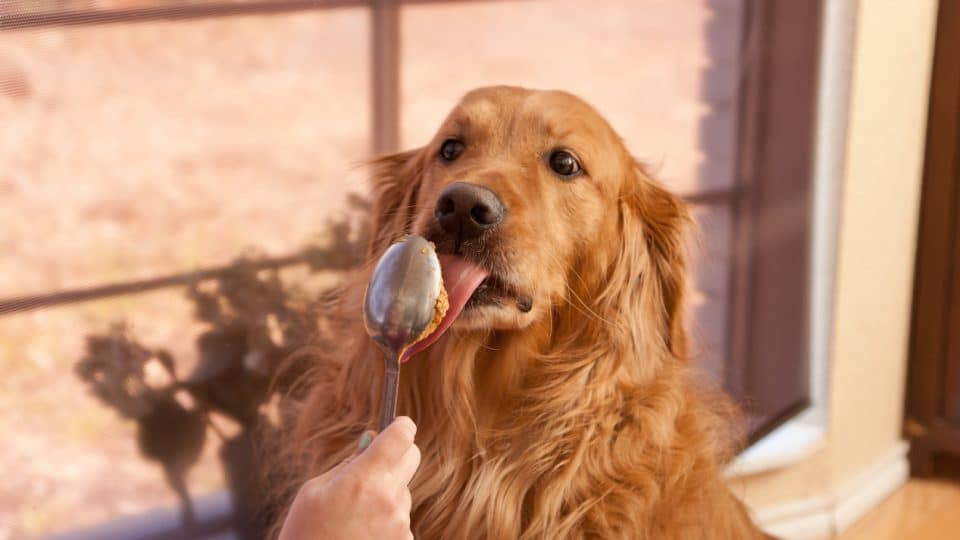Most nuts are generally safe for dogs, according to Dr. Greg Reinhart, Ph.D., an animal nutritionist with Pet Honesty. However, peanut butter is better for dogs because nuts tend to contain high levels of fat and can be a choking hazard.
If your dog accidentally got into nuts, it’s probably okay unless it’s a macadamia nut or mouldy walnut, which are toxic for dogs. We’ll discuss this more below and what to do if your dog has an adverse response to eating nuts. We’ll also explore which nuts dogs can eat and safe preparation.
Which Nuts Can A Dog Eat?
Whole unsalted peanuts or cashews are the best nuts for dogs, says Dr. Sean J. Delaney, BS, DVM, MS, DACVIM (Nutrition), and Founder of Balance.it. Roasted nuts without any salt, sugar, or sweeteners are also suitable for some dogs.
While peanuts and cashews are okay, it’s best to generally avoid feeding your dog nuts, especially almonds, walnuts, and pecans.
According to Tina Wismer, DVM, DABVT, DABT, nuts contain high amounts of oils and fats. This could cause your dog to have an upset stomach and potentially develop pancreatitis. If you notice your dog getting sick after eating nuts, contact your vet.
Which Nuts Are Toxic for Dogs?

Алексей Филатов via iStock
Macadamia nuts and mouldy walnuts are toxic to dogs. While the dose of macadamia nuts that induces toxicity is unknown, ingesting as little as 0.7 g/kg has been associated with clinical signs of poisoning.
If your dog has eaten a macadamia nut, mouldy walnut, or other potentially toxic substance, contact your vet or a local emergency vet immediately. Let the vet know what your dog ate and how much, and they’ll let you know if there’s cause for concern and the next steps to take, including whether or not you should induce vomiting.
How Can You Tell When a Dog Has Eaten a Toxic Nut?
Dogs who have eaten anything potentially poisonous show similar symptoms.
Signs of nut toxicity in dogs include:
- Weakness of limbs
- Depression
- Vomiting
- Tremors
- Hyperthermia
- Abdominal pain
- Stiffness
Can Dogs Be Allergic to Nuts?
It’s uncommon but possible for dogs to have a nut allergy. Dogs with a food allergy might show different symptoms than those who have eaten a toxic nut.
Signs of an allergic reaction include:
Can Dogs Eat Peanut Butter and Other Nut Butters?
Peanut butter and other nut butters are an excellent treat for dogs. Peanut butter is also safer than nuts since it doesn’t pose a choking hazard.
While dogs can eat some human peanut butters, Dr. Reinhart says, “purchasing peanut butter intended for dogs is a much safer option as dog-specific peanut butter tends to have healthier ingredients and are often lower in salt than peanut butter intended for human consumption.” You can find dog-specific peanut butters at your local pet store.
You can also use human peanut butters, but look at the ingredients to avoid too much sugar, sodium, or other harmful ingredients like Xylitol. Dr. Reinhart says, “some peanut butters are made with Xylitol, a sugar substitute, which is extremely toxic to dogs.”
How to Make One-Ingredient Doggy Nut Butter at Home
To make a one-ingredient nut butter for your dog, Dr. Delaney recommends using unsalted peanuts or roasted salt-free cashews, with no sugar or sweetener added.
To make nut butter, place the nuts in a food processor and grind them for a few minutes until they’re smooth. As you grind the nuts, their natural oils will release to make a creamy nut butter. The longer you grind the nuts, the smoother the nut butter will be.
Store your doggy nut butter in the refrigerator for up to three months.
What’s a Suitable Serving of Nuts and Peanut Butter for Dogs?
According to Dr. Delaney, daily treats, including nuts and peanut butter, shouldn’t make up more than 10% of your dog’s total caloric intake.
If you want to try giving your dog nuts, it’s best to start with one or two to ensure they react well. After that, stick to a small serving size.
For peanut butter, Dr. Reinhart says a little goes a long way. Peanuts are high in fat, so stick to about a teaspoon per day.
You can spread the peanut butter on a lick mat or occupational toy, like a Kong, and use it to hide medication if needed. Freeze the peanut butter so your dog can enjoy it longer.
Preparation Tips for Feeding Nuts to Your Dog
Dr. Aziza Glass, DVM and Owner at Personal Touch Veterinary Clinic, PLLC, recommends these tips for giving nuts to your dogs:
- Give small portions of cashews and peanuts
- If the nuts are large, cut them in half or thirds (the right size depends on the size of your dog)
- Avoid nutshells because they’re not digestible and can cause intestinal blockage or choking
- Don’t give salted or seasoned nuts to your dog without the approval of your veterinarian
Do Nuts Provide Benefits for Dogs?
While nuts and peanut butter are flavorful for dogs and have some nutritional value, many other treats are healthier. These include green beans, carrot sticks, broccoli, and watermelon.
If you want to offer nuts for their nutritional value, opt for whole, unsalted peanuts or cashews.


